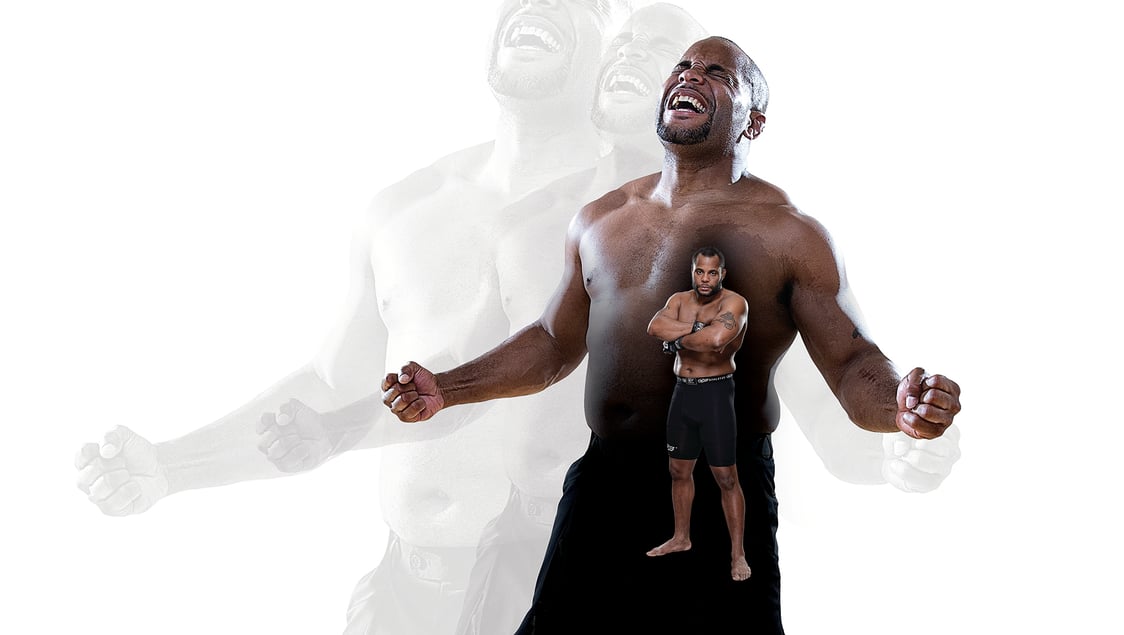
Issue 119
September 2014
There are two sides to Daniel Cormier. Family man TV analyst, and ruthlessly ferocious UFC light heavyweight contender. One is his future, one is his destiny.
The calm Dr. Jekyll has the cruel and violent Mr. Hyde. For introverted Bruce Banner there is the volatile and aggressive Hulk. Smooth UFC light heavyweight and part-time Fox TV analyst Daniel Cormier doesn’t have a name for his alter ego. The one that shows up on fight night and, in May, relentlessly punished and callously rag-dolled future UFC Hall of Famer Dan Henderson, then choked him unconscious. All just for a shot at Jon Jones’ light heavyweight title.
But the absence of a label isn’t the only thing that makes this second side of the former Olympic wrestler different from its fictional counterparts. Unlike Dr Jekyll and Banner, Cormier has control over his inner beast. And that might just be what makes the things he does in the Octagon even more frightening.
If you can’t find Daniel Cormier sweating through a training session at American Kickboxing Academy in San Jose, or resting at home with his two young children, Daniel II and Marquita, and fiancée Salina, there’s a good chance he’ll be in front of a camera at the Fox television studios in Los Angeles.
“I enjoy it a ton,” says Cormier of his abundance of TV duties. “I do the UFC weigh-in and post-fight shows; Jenn Brown, Kenny Florian and I host a show called UFC Now that plays every week on Fight Pass; I’m the alternate guy on UFC Tonight. I’ve got a lot of opportunities to do it now.”
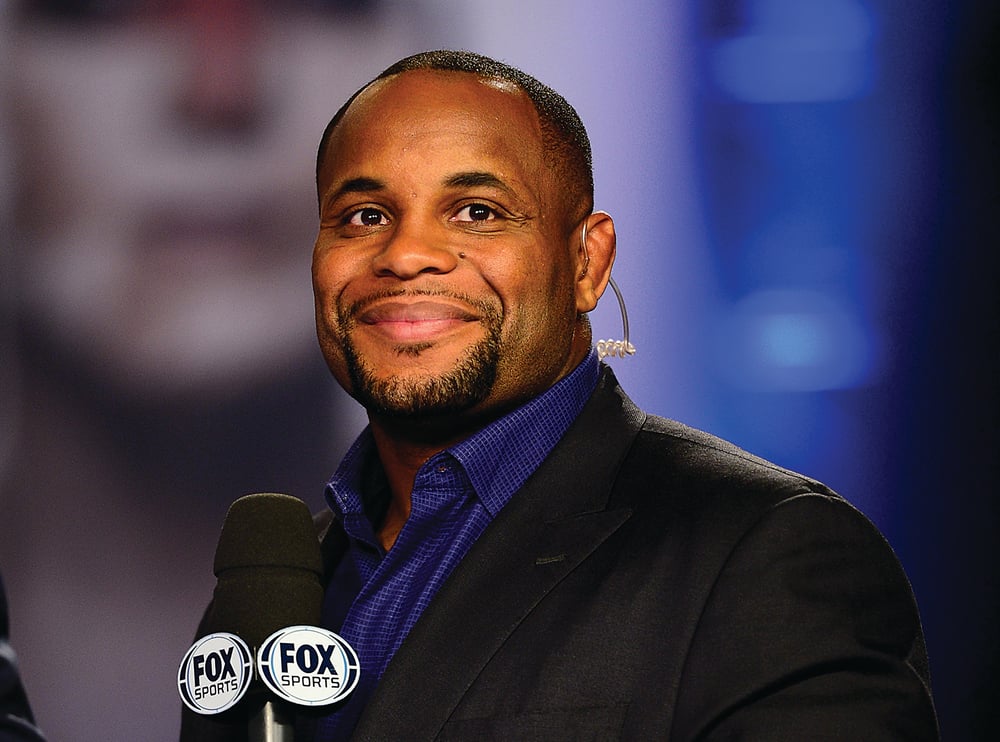
In fact the 35-year-old grappler is so prolific he’s perhaps becoming just as well known for his pundit work as his stellar 15-0 MMA career. That undefeated run includes wins over Henderson, Frank Mir, Josh Barnett and ‘Bigfoot’ Silva, earning him a chance at the 205lb belt around early 2015. It’s also made the ex heavyweight an authority when analyzing on screen.
Combining his respected opinion with his cool, calm demeanor and slick speaking style have made Cormier one of the UFC’s best on-screen faces. That’s thanks largely to the same habit of self improvement that’s made him a title contender.
Cormier explains: “Every time I do a show I call all the guys that are in charge and I ask them for pointers afterwards. ‘What am I doing right? What am I doing wrong?’”
Any glowing reports can be attributed to a long history in front of a lens. First when he co-hosted a program about coaching wrestling on a local TV station, during a college wrestling career where he became a Division-I All-American at Oklahoma State. And from media work involved in representing the US in freestyle wrestling at the 2004 and 2008 Olympic Games. “The one thing they don’t want us doing going into the media is embarrass our country by being idiots,” laughs Cormier. “So they really do put something into the media training.”
Being good also means being in demand, however. The ex Olympian’s filming schedule can keep him in LA or in Vegas as many as five days of the week. But the reason for his tough routine is simple.
“I’m trying to secure a future for my family,” says ‘DC’. “Hopefully it opens some doors when I’m done. I’m 35 years old. I’m not the youngest guy fighting in MMA. I’ve got to take advantage of every opportunity I have right now because they just may not be available in a couple of years. If I’m not fighting at the level I am right now, hopefully I can supplement my income with my TV career.”
He adds: “If I can provide for Salina and the kids for a lifetime that’s exactly what I’m going to do. And it doesn’t matter how tired I get, how much I have to work myself into the ground, it’s worth it if at the end of the day it allows for my kids to attend good schools, live in a nice house.”
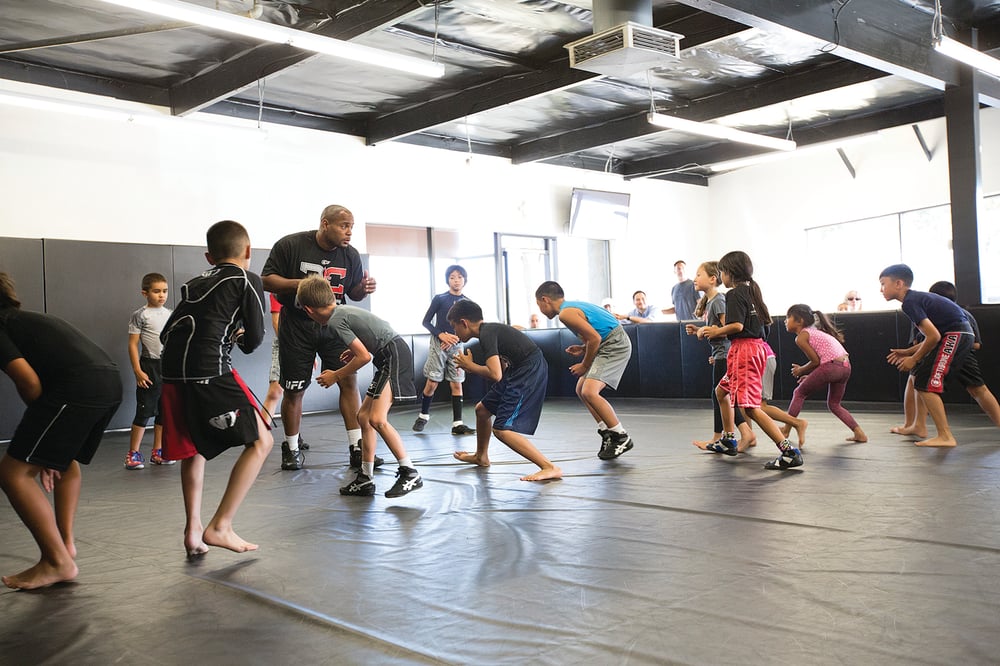
Fitting family time, not to mention gym work, into trips away from home for those TV opportunities has been tough for the Louisiana native. So, now, when he can, Cormier brings his brood along. They attended UFC 175’s International Fight Week around Independence Day Weekend with him, fitting in visits to the pool and evening dinners around appearances and obligations. And if he films a show in LA on the Tuesday he doesn’t stay over until Wednesday, he flies back that night. It’s a process born of his constant eye on improvement, he says.
“One of my biggest assets is my ability to focus on something and go out and get it, but it’s one of my biggest weaknesses also,” confesses Daniel. “I get so focused on one thing everything else becomes kind of secondary. And I was leaving everything in the back and focusing on trying to get my career started and get secure financially for me and my family.
“So at the end of the day I felt like it was all for them but they were missing the most important part of everything, and that’s having dad around to actually enjoy everything that we’re starting to get.”
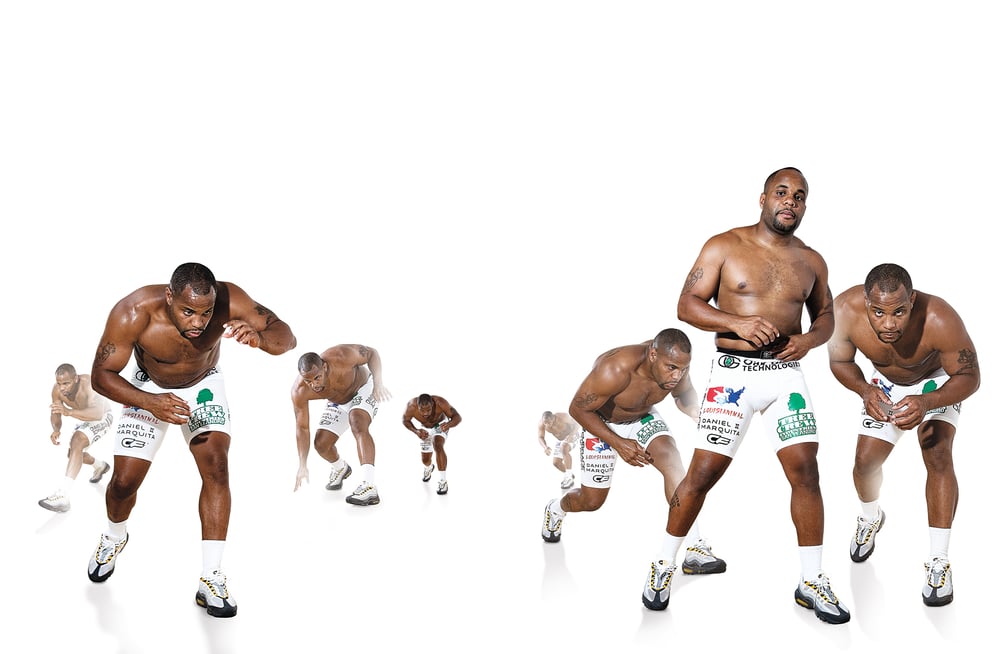
Walking to the ring, Daniel Cormier looks the same. He doesn’t adopt a monstrous physique, he doesn’t turn a different color. All the same, the suited-up Cormier you watched last weekend breaking down fights on television isn’t the one piloting the 205lb man with iron in his hands and 12-cylinder slams intensely stalking down the Octagon.
“I talk to myself before,” reveals Daniel. “It was something Kevin Jackson (freestyle wrestling coach) used to do when I would wrestle. He would always tell me stuff like, ‘This guy has nothing for you. This guy can’t beat you. You’re better.’”
Cormier relays he has an unwavering self-belief in his own abilities, and that’s never higher than when he’s about to step into the cage.
“That’s when you see that part of me where it’s like a laser focus,” he says. “I can’t see anything else but my opponent and my goal. I’m telling you, before Dan Henderson I was so locked-in on Dan Henderson that Jon Jones became an afterthought. Then when we got into the cage, all the stuff and all the preparation, mentally, physically, it came together. I was so focused.
“And I think that’s who I am in the cage. There’s this absolute focus on my opponent. It’s almost like I’m looking through blinders like those horses wear. Nothing else matters. Inside of that cage when that door closes I have absolute focus on that guy standing across from me.”
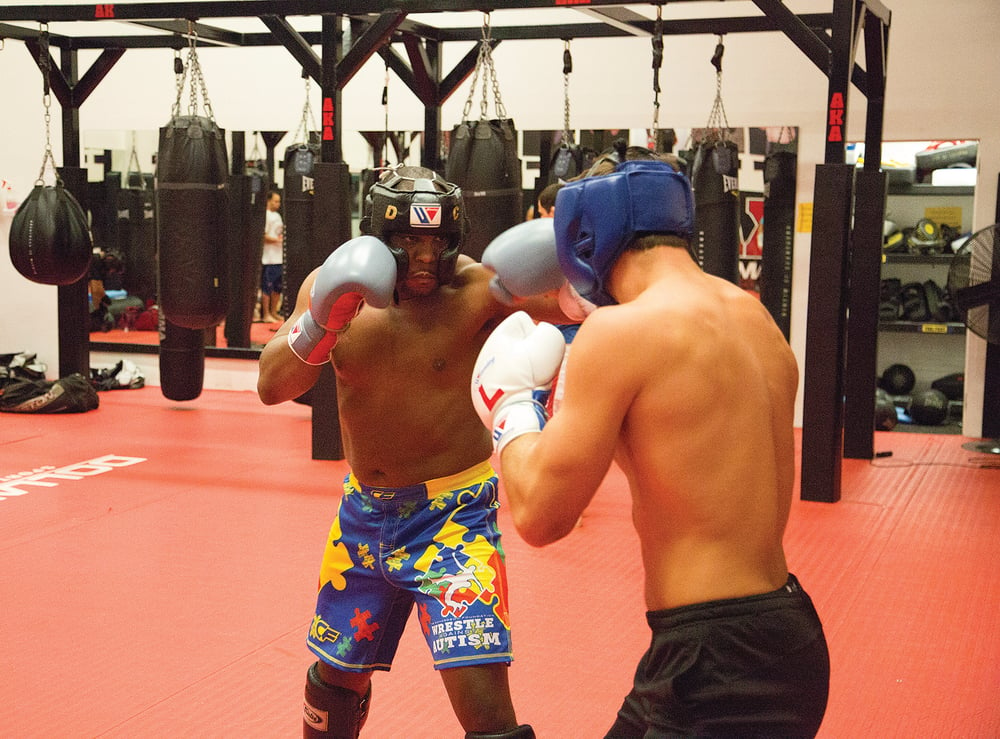
The result, 15 times out of 15, has been a one-sided drubbing. It’s no coincidence that his most dominant win, against Henderson, occurred when he was more mentally locked in than ever. Suggesting he’s getting better at steering that venomous mental state – at controlling the beast.
Which is bad news for whoever holds the UFC belt on New Year’s Eve 2014.
Again, his devotion to improvement is the reason. Previously, while waiting in the ring for Josh Barnett and Frank Mir to make their entrances, Cormier says he found himself fighting off a sudden sense of out-of-body awe, where he realized exactly who he was about to try to knock out. A weakness, in other words.
“The whole time I was getting ready to fight Dan Henderson, because I look up to Dan Henderson so much, I said, ‘I cannot be in awe of Dan Henderson as he’s walking to the cage,’” remembers Cormier. “So what I did was, every time I ran I listened to my walkout song first and the Dan Henderson walkout song second. Because it put me in the mind-set of, this is a fight.
“It’s not time to go, ‘Oh my God, Dan Henderson’s great.’ I’ve got to be ready to fight. To allow me to put myself in that place every time I started to feel – that drill worked so well I’d be running on that treadmill and I would start to get jittery. I would start to feel that nervous anticipation of getting into the Octagon.”
That kind of mental command, this mastery of his senses, is reflected in how he deals with the pressure of expectation and competition. He doesn’t fight the uncomfortable, he revels in it. When the stakes are the highest, it seems, is when he’s the most dangerous.

The night before he fights he can have up to 50 family members, all of whom have flown out to watch him win, in his hotel suite for dinner. And back home in Lafayette, Louisiana, even more family will hold viewing parties for his bouts – as will much of the city. But those aren’t the only eyes watching.
“I’ve had a lot of good people in my life make a lot of sacrifices to get me to where I am today,” admits Cormier. That’s no exaggeration. When Daniel was at Colby Junior College in Kansas, where he wrestled before transferring to Oklahoma State in ‘99, a court placed him on probation for charges relating to a fight where he broke another man’s jaw.
He would remain on probation until he paid off the other party’s medical bills. Daniel’s mom, who took on his rent for his entire first year of university, put a second mortgage on her home so there was no risk of an accidental violation while he worked toward his future.
And Cormier can reel off names like James Ravannack, who paid his high school wrestling trips and later started the Gator Wrestling Club just so he could pay Cormier a monthly stipend, and his ex-wife Robin who helped support him financially during his years qualifying for two Olympic Games.

Fiancée Salina holds the fort when he’s training or filming. Trainer Bob Cook let Cormier live rent free in his apartment when he moved to San Jose to begin his MMA journey five years ago, and gave him a car until he could get his wheels to California.
“Mike DiSabato, from (clothing brand) Cage Fighter, paid me $1,500 a month stipend before I had any fights, which allowed me not to go have to work in a bar at night to make money to survive,” he recalls. His manager, DeWayne Zinkin, even let a $2,000 check bounce without any qualms after his first fight, he says.
“I love carrying the burden of my city, my family, all these people, Zinkin Entertainment,” Cormier states, completely unfazed, and expressing a sentiment that’s often the complete antithesis of many a fighter’s mental head space.
“I just want to compete,” he states, revealing his machine-like drive. “I want my heart to race. I want to feel that, ‘I’m going to do something against somebody and we’re going to see who gets the better of who.’
“That’s my approach when it comes to competition… Some guys may just like to fight. I don’t mind the fight. I love to compete, man. I truly believe that’s what I was put here to do: just compete.”
It appears the time we thought we’d seen Cormier at his most vulnerable actually revealed how fearsome his in-fight identity truly is.
In February, UFC debutant, and one of Cormier’s former Olympic wrestling training partners, Patrick Cummins stepped in to fight DC on 10 days’ notice in place of an injured Rashad Evans. To both hype the fight and rattle Cormier live on Fox Sports 1, Cummins claimed he’d beaten the undefeated star so badly on the Olympic Training Center mats he’d reduced him to tears.
The allegations seemed to infuriate Cormier, who, speaking via video link, verified them and later noted he was then dealing with the loss of his three-month-old daughter, who in 2003 died in a car accident.
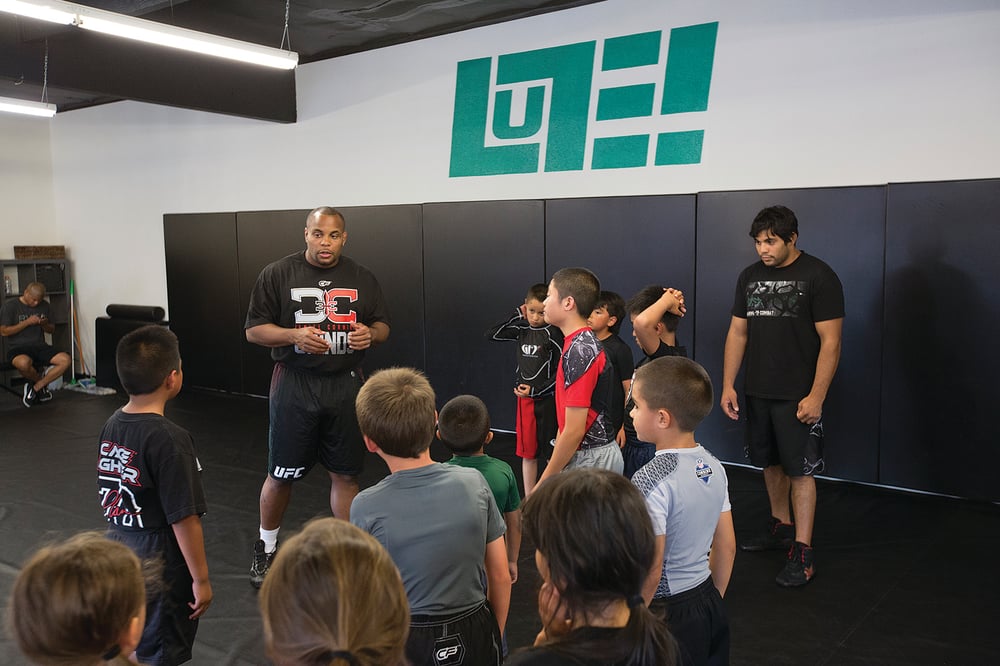
Watching the ferocity of Cummins’ subsequent 79-second TKO destruction at UFC 170, it certainly looked like Cormier was fighting on fury. Not so. “It did upset me to a point,” he says, “but never to the point where I’m going to go into the cage and fight with my emotions. That’s not what I do.” And here’s where that unnerving cerebral competitive mind of Cormier’s comes into play.
“My coaches put a lot of time and effort into preparing me for these fights,” he explains. “So for me to go out there and fight because I’m mad, that’s not being fair to the preparation they’ve put in and the time they’ve put in.
“I’ve got two boxing coaches that drive two-and-a-half, three hours a piece just to train me two to three days a week. That’s commitment.
“For me to go out and want to fight Patrick Cummins based on being upset with him, not based on the game plan these guys have given me? That’s unfair to them. I can’t do that to my coaches.”
Even despite being thrust into a quintessential red-mist scenario, Cormier’s sharp predatory instinct cannot be overridden. Why? Because he knows it wouldn’t be the most competitively effective thing to do. He has been given a blueprint for victory; if he follows it, he will conquer, beat, obliterate his opponent.
That’s what makes this second, fight-night side of Daniel Cormier more than merely a bullheaded brawling alter-ego. And so frightening.
By jacking himself up in his changing room, he tells this persona when to switch on, and, unlike those aforementioned make-believe characters, permits himself to do the things he does. He’s at once completely in control and entirely under the will of what he’s automated to do. Running through Dan Henderson was not involuntary, it was intentionally allowed.
For the past 24 years, Cormier has developed, honed and now perfected this inner animal, first on the wrestling mats for Olympic gold and later in the cage for mixed martial arts glory.
He doesn’t fight with anger, fear or under distraction, only with pure focus and purpose. It’s as impressive as it is formidable.
And just think, this animal might get a UFC title shot.

Three's company
In addition to his lighter and darker personas, there is a third side to Daniel Cormier that no one ever sees outside the gym, according to his American Kickboxing Academy training partners. That of the joker. One whose material predominantly involves them as the punchlines.
Says Cormier: “The guys have a running joke at the gym. They’re like, ‘Man, you’re the biggest ball-buster I’ve met in my fricking life. I hate you.’ Sometimes they go so far as to say they hate me. I’m like, ‘How can you hate your own friend?’ They’re like, ‘I hate when you’re on TV because everybody sees you and thinks DC’s a great guy.’ I just go, ‘I am a great guy, I just like to have fun and mess around.’”
Did you know?
Daniel Cormier’s first break on MMA-related TV came on ESPN’s MMA Live on the recommendation of ex-Strikeforce champ and current Bellator name ‘King Mo’ Lawal. The two wrestled together at Oklahoma State.
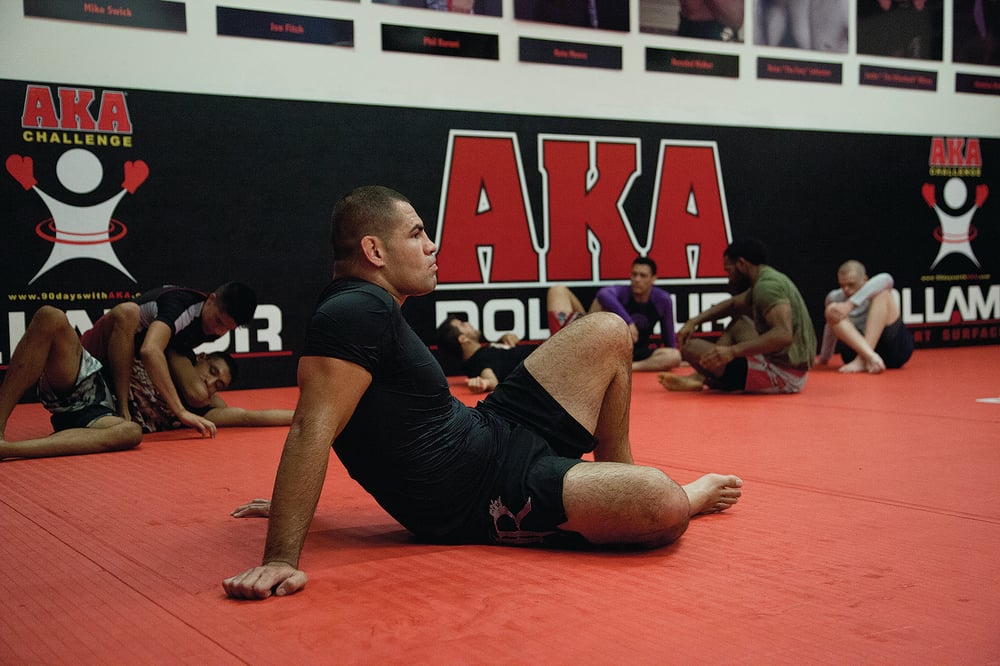
Oh brother
Dan Henderson, Frank Mir, Josh Barnett. Fearsome UFC legends have been put in front of Daniel Cormier in his career. Each of their reputations and all of their accomplishments have tested the wrestler’s mettle, but none have broken it.
Thanks, in part, to the capabilities of his primary sparring partner: UFC heavyweight champion Cain Velasquez.
The two have, by now, spent years testing one another, and their fellow AKA teammates, behind the closed doors of the San Jose gym.
Inevitably, Cain and Daniel have formed a tight bond. So much so that watching his friend fight brings on unique symptoms. “My heart beats so fast, my stomach hurts,” says DC. “There’s nothing like watching my teammates fight. It’s the absolute worst.”
Fortunately for Cormier, and Velasquez, they have only had to suffer one occasion where those symptoms were not alleviated with a win: when Cain was knocked out in little over a minute by Junior Dos Santos in the first-ever UFC fight on mainstream, primetime US television.
“The saddest time I’ve had was after the first Junior Dos Santos fight,” Cormier recalls. “When after Cain lost the belt we all went to dinner and we all sat around. Because there was nothing I could tell him to make him feel better. There was nothing I could have done in the moment to actually help him.
“Even with the (prior knee) injury there was nothing we could have done to actually help Cain as he went to the cage and fought the second-best guy in the world, essentially on one leg. There was nothing we could have done for him. That’s the hard thing. You don’t want these guys to feel that.”

Blooper reel
Daniel Cormier is now firmly entrenched as one of the go-to analysts for Fox TV’s coverage of UFC events. Although he very nearly wasn’t.
He scored his first Fox opportunity at UFC 155, primarily because he was cornering training partner Cain Velasquez in the heavyweight title main event. Cormier had worked with the UFC’s VP of studio and Spanish production, Kieren Portley, when he was at ESPN and involved with MMA Live.
Portley had been impressed by Cormier’s turns as a pundit on that show and campaigned for him to get a shot on Fox programming. And that first chance went well – for a while.
“I had a terrible, terrible mistake while I was on the air,” remembers Cormier. “When we were live from the arena, I was talking and it was Kenny Florian and I (as analysts), and Ariel Helwani’s report starts playing in my ear as we’re live on national television. I had never done live national TV before, because even MMA Live was a studio show. I stop mid-sentence and go, ‘I can hear Ariel in my ear.’
“You should have seen Kenny’s face. Kenny was like, ‘Uh, erm.’ These guys are professionals and it’s lucky they are because they kind of walked me right through it, and when we went to break Kenny told me, ‘Hey, you can never do that.’
“Even though I’m working for Fox now, it could have ended on that day, the very first time I did it, because I made such a terrible, terrible mistake. The guys were cool about it. The producer, his name’s Zach Candito, he walked me through what I did wrong, what I could do differently, and they gave me another chance. And thank goodness,
you know?”
...
